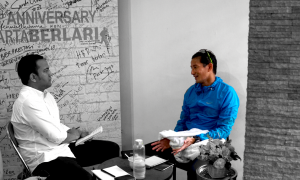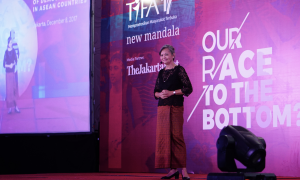Editor’s note: New Mandala’s guest editor for the “Changing Malaysia” series, Prof Meredith Weiss, interviewed Malaysian Foreign Minister Dato’ Saifuddin Abdullah on 12 February 2019, at Wisma Putra (the Foreign Ministry) in Putrajaya, Malaysia. The transcript has been lightly edited and condensed. The discussion makes reference to the recently promulgated “Foreign Policy Framework of the New Malaysia”.
How did you come to be Foreign Minister and what most excites you or makes you nervous about the post?
As a politician, if I told you I didn’t expect to be appointed as a minister, I’d be lying. But if I told you I did not expect to be Minister of Foreign Affairs, that is the truth—I never thought I’d be Minister of Foreign Affairs; I thought I would be Minister of Education, or this or that. The worst part of being Foreign Affairs Minister is that you travel quite a bit and because of that, you have less time in your own constituency. That’s the worst thing. So you really have to navigate your time. As much as possible, once you are back home, you have to be in your constituency.
But the best part of it is, is the golden opportunity to show the New Malaysia to the world.
You have come on the job at a rough time in some ways for global foreign policy, with Trump, Brexit, the refugee crisis, trade tensions, other challenges for democracy abroad … How does that change the nature of your work?
There are two things to note here. Number one, regardless of those challenges, I have the benefit of having Tun Mahathir as a prime minister. Most literature on IR [international relations], on foreign policy, will tell you that the head of government is actually the de facto foreign minister, and especially so when the head of government is actively involved in international issues. Prime Minister Mahathir was prime minister and he is well-known worldwide. Also, he’s still very actively involved in international issues. So that is a big, big plus for me, because it actually opens doors in meeting people, because they say, “Oh, who’s this rookie? He’s the new foreign minister of Malaysia. Oh, they have a new prime minister, but it’s Dr Mahathir”.
The second point to note, yes, it’s very challenging in some sense, because suddenly you are faced with multi-disciplinary situations where, say, we have to come up with a policy as to how we handle trade sanctions Then, I sound like I am minister of MITI [Ministry of International Trade and Industry]. And perhaps this is also the reason why our ministry and MITI are working very closely together, perhaps more than ever before in the history of Malaysia. In fact, one of our policy statements states that one of our objectives now, and one of the types of work that we do, is economic diplomacy. I am organising joint and interagency meetings with MITI. It helps that Darell [Leiking, the Minister] is an old friend, a good buddy. You will see the Ministry of Foreign Affairs and MITI working very closely together.
It was quite noticeable in the framework that you discuss a new emphasis on economic objectives. Especially with the prospect of a global downturn and the need for complex coordination across agencies and actors, public and private, domestically and internationally, how do you as Foreign Affairs navigate that?
Well, on the one hand, as we were writing the framework, I was asking the basic question, what do our ambassadors actually do? Our three main objectives are, of course, security, economics, and our cultural identity. When it comes to security, we are not at war with any other country, but we want to be a trading nation, and we want to be friendly with all. That was when we decided that economic diplomacy should be an important part of our work. Which is to say that from now on, we have already started asking our missions to work more closely with MATRADE [Malaysia External Trade Development Corporation] and all the other MITI agencies overseas. But also I think when it comes to preparing our future ambassadors, business acumen is going to be one of the criteria. Yes, you are a diplomat, you are not a businessman, but you have to have some business acumen. Because otherwise, you will not be able to implement what we are calling economic diplomacy.
On the other hand, sometimes challenge makes you work in a certain way. A good example is palm oil. We are facing a lot of challenges from Europe. I was recently in Brussels for the ASEAN–EU ministerial meeting, and I was thinking, this palm oil issue is not just about palm oil; it is about protectionism, it’s about deforestation, it’s about climate change, and so on. So immediately after I came back, I held an informal inter-ministerial meeting. We invited the minister in charge of Primary Industries, which includes palm oil; the minister in charge of MITI; the minister in charge of Environment; and the minister in charge of Natural Resources, which includes forests. I thought we had a very good discussion. We were very clear that the lead agency is the minister in charge of Primary Industries, but we need to coordinate our work. The Minister of Primary Industries has organised a palm oil “war room” and they have things that they need to do or want to do. But during that meeting, we told the minister that we all want to help out when it comes to palm oil. You see, when it comes to palm oil, you will find when the minister in charge of Primary Industries, Teresa Kok, goes overseas to campaign for or to promote palm oil, she will also have to answer questions on environment and deforestation. As the Minister of Foreign Affairs, I have to do the same thing. But you also want the minister in charge of Environment to go out and talk about palm oil, and not just talk about plastic or the sea; and you want the minister in charge of Natural Resources to go out, not only to talk about natural resources issues, but also to talk about palm oil, because it is related. So these are the kinds of things we are doing now.
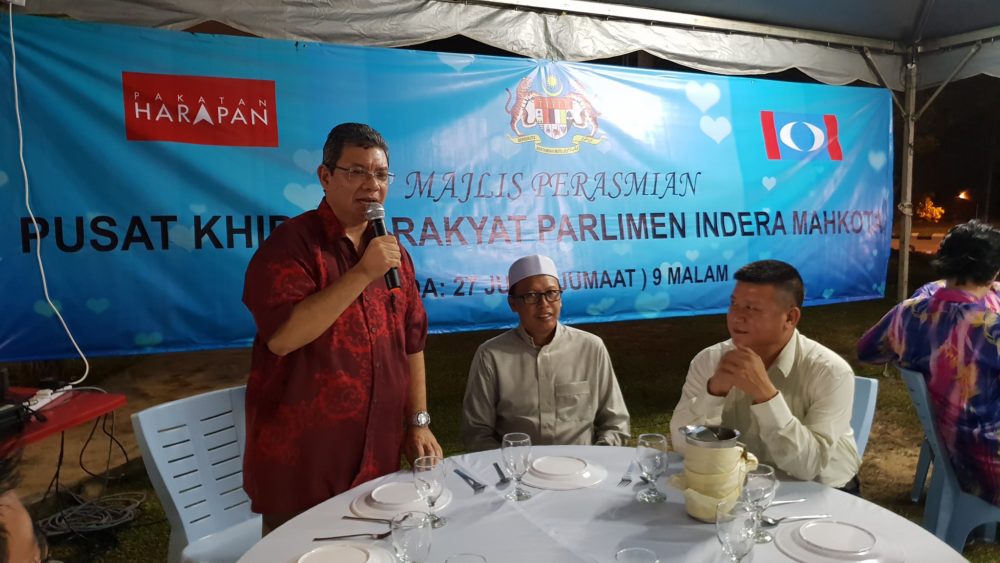
POLITICAL CAMPAIGNING IN CONSTITUENCY (PHOTO: SAIFUDDIN ABDULLAH ON FACEBOOK)
You mention in the framework document that your goal is to push for fairer international trade and financial systems, not just Malaysian interests. From the perspective of the Foreign Ministry, how do you do that?
There is an ongoing debate, from the TPP [Trans-Pacific Partnership] to what is now known as CPTPP [Comprehensive and Progressive Agreement for Trans-Pacific Partnership]. More often than not, when it comes to international trade treaties, the lead agency is MITI. But what normally happens in Malaysia is that a treaty will come from somewhere and you are reacting to a proposal. But now we are saying, look, this proposal is not plucked from thin air. Ideas leading to this proposal would have been already put on the table, in various discussions and seminars, perhaps a decade ago. So what we are saying is that there are already some treaties that we have signed, we may want to review. There are treaties we are about to sign and ratify; we will have to look at each in detail and make decisions. But we also must be able to focus on what is going to happen five years or ten years from now. For example, internet governance. We can’t wait until somebody comes up with a text, or until a letter comes to my office saying, please look at this proposal. I think we need to be more proactive, we should be able to pre-empt whatever kind of treaties are coming and be involved in the discussion, because by the time you go from four or five texts and agree on a single text, there have been discussions and seminars and conferences and meetings. And I think we need to be proactive by looking at what is to come five, ten years from now, rather than only react once those things come knocking on your door.
One of the things that’s quite striking about the foreign policy framework is the consultative framework you have set up. Could you say more about the process of developing the framework and how the consultations worked?
There is a history to this framework. There was a group assembled in around 2013 and 2014, while I was in GMM [Global Movement of Moderates], of about 60 people, comprising leading former diplomats, leading academics, and professionals, including businesspeople and civil society representatives. They came out with a report. The editor was Professor Muthiah [Alagappa]. That paper was presented to the prime minister back then, but nothing happened. I read the paper when I was CEO of GMM and I thought, this is a very good paper. Never thought I would become Minister of Foreign Affairs. So the moment I was assigned here, the first thing that came to my mind was, can I have a copy of that paper? So we studied it again. And if you look at our framework, you’ll see a lot of it came from that paper. Now, that by itself was a consultative process. I think they spent three to four months working on that paper. Sixty people, the who’s who in foreign affairs were involved. So who is Saifuddin, who suddenly became Foreign Minister, to think that I know better? So I used that paper as a guide.
We formed the Consultative Council, involving people from the ministry, former diplomats, academics, and people from civil society. I penned it in Malay, and then, once we agreed on it, translated the whole thing to English. We had one proper meeting with the Consultative Council, and then we shared the document online and they gave their feedback. Besides that, there were other consultations. We had a series of meetings with academics, with university lecturers, and with students. With the students, it was town-hall meetings. I presented the skeleton of the foreign policy, and then there were questions from the students – bear in mind that they’re not IR specialists, they’re not even students of IR, most of them. Their questions tell you the kind of sentiments they have, or the kind of aspirations they have for the country. We took notes on points that were raised. If you see Palestine and Rohingya mentioned in the framework, it’s not just because we want to do work on Palestine and Rohingya—of course we want to address Palestine and Rohingya—but because these are the two most common questions that come from the floor, everywhere you go. What the questions were leading to was, as a Muslim country, what else can we do? So we had different ways of consulting.
And we proposed the formation of a foreign policy select committee in Parliament. Before the consultation started, I tabled a motion in Parliament. It started with the Prime Minister’s speech on 28th September 2018 [at the United Nations]. We knew from Day 1 that the main points of our foreign policy would be from that speech. And then I presented a motion in Parliament [on 15 October 2018], and we actually had one whole day in Parliament. I presented the framework, in skeletal form, in my oral presentation to Parliament. And then there was a very good debate; about 14 MPs participated and I did the summing up. And then there was a vote, unanimous: people agreed on the parameters or the main gist of the framework. And from there we continued writing with the aid of consultative and town-hall meetings, etc., until we produced the final version. The final version was then distributed to all the relevant ministries for them to comment, and then it was presented to Cabinet where it was also passed. And we’ve promised that we will continue consulting people as we go on trying to implement the framework.
Do you know if other ministries are doing anything similar?
The Ministry of Defence is coming up with a white paper to present to Parliament. I think they have also organised consultations. Besides that, there are a few other ministries who have also established some sort of consultative council, for example, the Ministry of Education, and Ministry of Agriculture—these two I’m very sure, but I know there are at least one or two more. Which is to say that consultation is almost like a cornerstone of the new approach of the new administration—something that was not very often done before.
In the framework, you say that you desire to present Malaysia “as an exemplary Islamic country” and Maqasid Syari’ah as “a vital reference in charting the nation’s development strategy”. Could you say more about how you intend to do that?
You see, when you look at the individual Muslim countries, the OIC members, for example, and you compare our achievements on some of the international rankings, when you look at the top ten countries in many of those indexes, of justice or happiness or whatever, sometimes not even one of the Muslim countries appears to be in the top ten. Which means the room for improvement is so massive. So what do we do? What can we contribute, as Malaysia, to the Muslim world? Surely our foreign policy is not just about fighting for the oppressed. We will continue doing that, and we will try to do even better, for the Palestinians, for the Rohingya, and for other minority groups. But surely there is more that we can offer the Muslim world. We have been doing some substantive work, for example, on education, by inviting students from the Muslim world to come to our universities. We have scholarships for students and for civil servants—this is called the MTCP, the Malaysian Technical Cooperation Program, which we offer to, basically, developing countries, and many of them are Muslim countries. But what about democracy, what about human rights, what about others? Surely we can also offer something, and this is why we write our foreign policy in that manner, with the Maqasid Syaria’ah. Issues or topics like Muslim democrats should be brought to the OIC platform—but not just to Muslim countries, even to the world. I think we also have the responsibility to show to the world that Islam is not just about ISIS and IS, or what Trump tweets about, but there is—though I don’t like to use the word—the “real Islam”.
Do you resent having to make up for the less exemplary actors who claim to be acting in the name of Islam, in terms of that image?
I think there is a responsibility to show to the world what Islam is all about, and especially so when you are faced with the threat of terrorism and radicalism, especially now, when we have Daesh. We know that Daesh, though they seem to be fading away, will re-emerge somewhere else, with a different style, a different name. And also we are facing an Islamophobia challenge, coming from the West. I think we need to share the actual narrative of Islam, and we take that as part of our foreign policy responsibility..
You may also find mention of the “Malay World” in there [the foreign policy framework].[1] Well, the Malay world has a unique civilisational experience with Islam and culture. Remember Huntington talked about the clash of civilisations? You don’t see that in the Malay world. The Malay world is really a place where civilisations meet and those looking toward the advancement of Islam in the future can look not just at the Middle East, but also at the Malay world as an example.
You note ASEAN as the cornerstone of Malaysian foreign policy. How does the change of Malaysia’s government affect Malaysia’s position within ASEAN?
Well, not politically. Because politically, we change our chairmanship every year, so on the official side, I think things will go on as the tradition has been. But Dr Mahathir is a big name, and many people in the ASEAN community, including heads of government, look up to Dr Mahathir for some form of leadership. And I think Malaysia can play its own role, like providing moral leadership to the grouping. It’s not just because of the new government, but Malaysia is taking this opportunity to impress upon the other members that the natural cooperation for ASEAN is really to strengthen its economic standing. There are three things that Malaysia is trying to assess and to provide some kind of leadership on.
Number 1 is to increase intra-ASEAN trade. The numbers will show you that we are nowhere close to what is happening in the EU, but of course we know that the EU is really something quite different. But having said that, surely we can improve our intra-ASEAN trade. Especially when you are faced with the trade war between China and the US, herein lies an opportunity—or rather, all the more reason why you need to work together.
Number 2: every time when I talk to my counterparts from outside the region, especially my counterparts from the EU and North America, one item on their wish-lists is that they prefer talking to ASEAN as one single market. Again, we cannot compare ourselves with the EU, but we have to be able to work as a grouping, making full use of the 640-odd million population, which is really a big market. So we may not be able to behave or act like a single market, but it is a big market, such that we should optimise this market that we have.
Number 3 is very much Tun Mahathir’s idea: that ASEAN should be a real producing hub, and not just individual countries exporting raw materials to other parts of the world. Every time he meets his counterparts, he keeps trying to impress that there must be some joint-venture projects among ASEAN countries. Maybe it is difficult to get all ten countries to work on a single product, but surely two or three countries can work on a product and market it together. So these are the three items that are now on the table.
Business as usual: regime change and GLCs in Malaysia
Pakatan is using state enterprise as a tool of patronage just as well as Barisan.
You note that a mission of the new government is to fix Malaysia’s international image, from a country riddled with a massive corruption scandal to a country that is known for its clean and fair government, and that upholds rule of law. How much do you find that credibility is a stumbling block, given that very recent past, or do you find that there are unrealistically high international expectations for change?
I think it is more the latter. I think there are a lot of expectations, and we have to walk the talk, otherwise people will look at you and say, hey, what are you guys trying to do?! So because of that, this is where I normally go back to my favourite phrase, that foreign policy begins at home. Until and unless you prove that you are doing it seriously at home, no one will believe you outside. So I’m very pleased that the prime minister is taking this issue very seriously. He has just recently launched an anticorruption plan of action, which I think is a very strong document. He has before this launched an inter-agency anticorruption committee, and he took the trouble to travel to Vienna to speak at an international conference on anticorruption. He attended that, I think, to prove that he is very serious about it. So in my conversations with my colleagues from outside, I think they understand very well that we are serious about fighting corruption. They know that it is not easy, and of course we have to prove ourselves.
There is a lot in the framework about developing a knowledge culture and developing the ministry’s human-capital resources. You have spoken in the past about lack of awareness of or interest in foreign policy, even among MPs. Do you find that there is sufficient interest and expertise, not just within, but also outside, the Ministry of Foreign Affairs to have the sorts of consultations and to play the sorts of roles you would like to sustain?
Not many people really understand what foreign policy is all about. We need to sensitise people that foreign policy is not an elite thing, that it is about everyday life, and that foreign policy is directly impacting whatever is happening at home, and vice-versa. I think we need to inform people that foreign policy is very much a domestic matter—much as it sounds like it is out there, it is very much in here.
I am quite happy that, generally speaking, the officers at the ministry are professional; they are well-trained. But we also need to improve in certain areas. For example, of course, we have to keep on improving our English, but I think we need to have a good pool of officers who have a sound proficiency in all of the UN’s working languages. Number two, in future, we have to ensure that in every mission abroad, we have someone among our rank and file who speaks the native language—this is not the case now. Like for example, our ambassador to China does not speak or write Mandarin, but we do have someone there who speaks Mandarin. And also not all of our ambassadors in the Middle East speak and write Arabic, although we always have someone. In the future, we have to ensure that we have ambassadors and senior officers who speak the native language, or at least the working language of the country. Because the world is becoming more complex, and sometimes decisions have to be made almost on the spot, where we no longer have the luxury of time to contact the capital to translate.
The next thing is content experts. We need to start seriously training our officers to become not only experts in diplomacy, but also content experts. For example, there are some very broad international areas of concern that everyone should have a good understanding of. You don’t have to be an expert on all those broad agendas, but you need to at least be very good with one of them, if not many of them. For example, on issues like human rights—under human rights, there are various themes, like religious freedom, children’s rights, women’s rights, and so on. And then you have environment. Again, there are numerous themes. And so too with free and fair trade. So we need to have people who are content experts.
And finally, negotiation skills. I find that not everyone can negotiate. Negotiation is not just a skill: it is both an art and a science. And we need this.
We need to train our own people, but we also have to be very open in outsourcing or using experts from outside, from business, academia and from amongst professionals. For example: in a recent conference in Holland, I thought the ministry did the right thing by bringing Professor Gurdial Singh Nijar as part of the delegation, because Gurdial has some experience in dealing with negotiations. Gurdial is one of the members of our Consultative Council, and the reason why we roped him in is also because there may be occasions where we need experts like him to be part of our delegation at conferences.
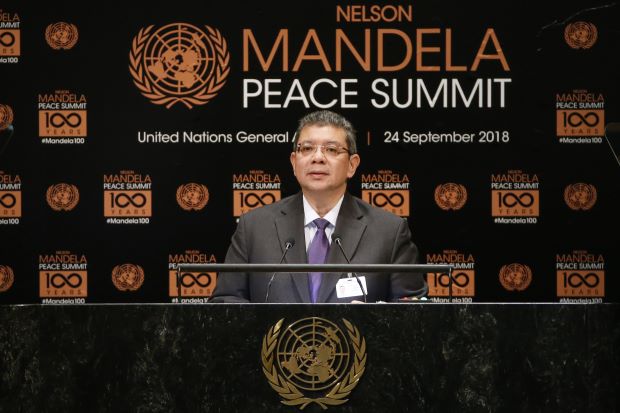
MINISTER AT THE UNITED NATIONS, SEPTEMBER 2018 (PHOTO: SAIFUDDIN ABDULLAH ON FACEBOOK)
You note quite ambitious goals for developing think tanks, such as Malaysian ISIS [Institute of Strategic and International Studies]. Why has Malaysia slipped on that front or not advanced, and how can you as a ministry nurture organisations that by nature need to be at least substantially independent and critical-minded if they are to be effective?
ISIS is an independent organisation. It was until recently under the auspices of the Prime Minister’s Department, but now it is under us. But we have an understanding with ISIS. I met with the board and I told them, you are going to remain independent. We take it that the only reason they are with us is for administrative purposes. You have to park ISIS somewhere, to put it bluntly. Somebody has to sign the cheques, that’s all. I told them that they have to remain independent. There was a time when ISIS was very highly respected, but they slipped quite a bit because I think they had the wrong emphasis, to a certain extent, instead of doing their core business. To me, their core business, is, number one: international and strategic studies, which includes security. Number two would be economics, international economics. They should be looking at trends and advise the government, and further ideas and so on. But also it has something to do with, perhaps, the previous administration’s way of controlling ideas or limiting freedom. I think the current administration is very clear about the meaning of freedom. And I told ISIS, you are free to even criticise the government if you need to. If not in public, then in private, but you have to be thinking on your own, you have to be seriously independent. And when you look at the growing numbers of think tanks being established for the past five to seven years, I think the ones that prosper are the ones that are really independent. And there’s no way you can control think tanks, because by definition, they are not supposed to be controlled by any one.
How do you balance the need to be closed-door and decisive in some policymaking versus advancing transparency and openness?
I think the word is practicality. We want to be as open as possible, and to discuss matters with as many stakeholders as possible. But sometimes we also have to be very cautious, especially when dealing with some matters which may be considered sensitive by some quarters. In dealing with issues like trade relations, many of the discussions are conducted below the radar. For example, we inherited some contracts made by the previous administration, and we have decided to discontinue several projects, and this was quite easy because they have not yet taken off. Some are still under discussion and we are very careful about it.
So, there are things we have to navigate. For instance, on the Rohingya, we stop at nothing. We simply say what we want to say about the Rohingya, we are very open about it, and my counterpart, the foreign minister of Myanmar, understands very well. He will just keep quiet as and when we say something less diplomatic. He understands perfectly where we are coming from, but at the same time, we are saying that we also want to work with the Myanmar government, to make sure that things improve. Our position on Rohingya is very clear, and we say it even in front of our counterpart from Myanmar. Number one, perpetrators have to be brought to justice. We are very clear about it, and they know it. Number two, we want repatriation to occur, in the best manner. And number three, we are of course committed to helping on the humanitarian side, both there and in Bangladesh. We have a field hospital in Cox’s Bazaar, run by MinDef [Ministry of Defence], it’s actually an army field hospital in Cox’s Bazaar—there are more than 140,000 Rohingya there, by UNHCR’s estimate. We want to enhance our humanitarian assistance, most of it through NGOs. And we are hoping that the pledge by the Qatari government will come through soon, US$50 million for humanitarian assistance, education, welfare.
You have “change in continuity” as your theme. What do you see as most important to maintain and what do you see as most important to change?
I think the basic fundamentals of foreign policy will remain intact. For example, we want to be friends with all countries, except Israel. We want to trade with all. We practice principles of neutrality and non-interference. That will remain intact… But there will be new approaches in the way we do things. For example, it has always been the practice that foreign policy is about government to government, party to party, and people to people. But more often than not, in the previous administration, foreign policy was very formal. We will maintain the formalities and formal structures, of course. But we are more open to engaging, for example, the business sector and especially civil society organisations. I think our office for the past nine months has received visitors who were at one time banned from coming into our office. Before the UPR [the UN Human Rights Council’s Universal Periodic Review] process, we had visits from both sides of the CSOs—the liberals and the conservatives. So we are more open to that. In fact, we engage with them. It’s not because they want to come, but actually, we invite them to us.
We are open to visits by any of the international rapporteurs. I had a meeting with the UN Special Rapporteur for Myanmar. Both of us happened to be in Bangkok at the same time, so I had a good meeting with her. She asked if she could come to Malaysia, I said any time. We did not say we have a standing invitation to all, but we say if people want to come, we will receive them. We will try our level best to accommodate all the international and UN special rapporteurs. Human rights issues are no longer taboo to be discussed openly—even issues like LGBT, which was previously off the table I think—we can discuss all kinds of things. Of course, economic diplomacy is something that we consider important as part of our work. Yes, ASEAN remains, if not the cornerstone of our foreign policy, still premium, but we are going beyond politics into the economics of ASEAN. Consciously we are saying, look, we want to do this. So it’s not just MITI talking about trade, but even MoFA is talking about trade. And when we look at the Muslim world, we are saying our role is not just to fight for the oppressed, but also to offer more in terms of progress and development. So continuity in terms of the fundamentals, but change mostly in the approaches, the way we look at things and the way we do things.
 Facebook
Facebook  Twitter
Twitter  Soundcloud
Soundcloud  Youtube
Youtube  Rss
Rss 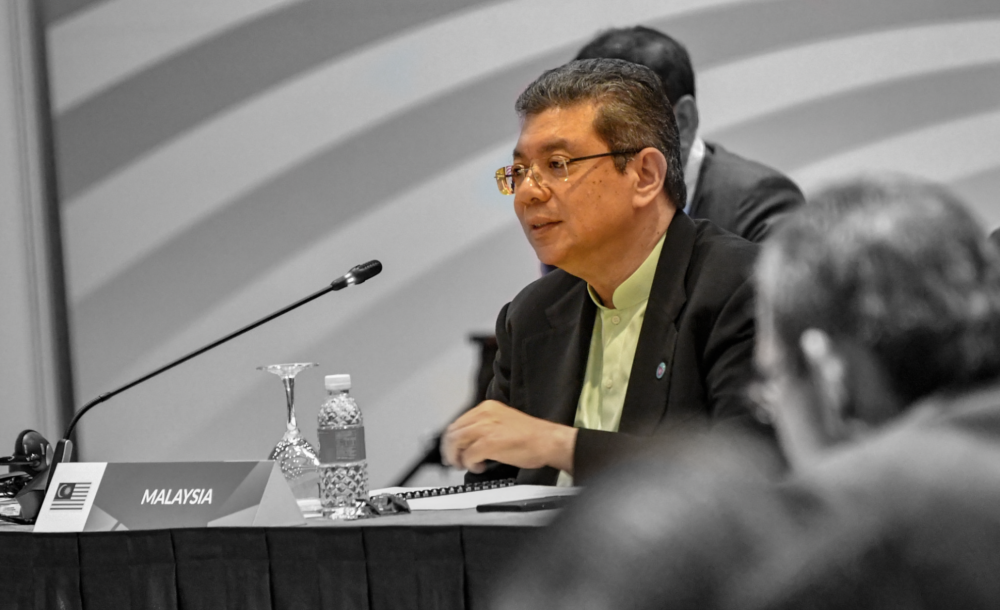
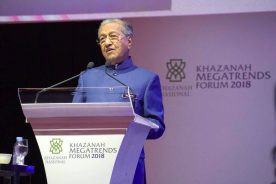
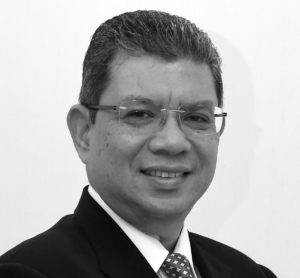 Dato’ Saifuddin Abdullah is Malaysia’s Minister of Foreign Affairs, Member of Parliament for Indera Mahkota and Chief Secretary of Pakatan Harapan (Alliance of Hope). Previously, he served as the Deputy Minister of Higher Education, Member of the UMNO Supreme Council, CEO of the Global Movement of Moderates Foundation (GMM), and Director (Strategic and Social Development) of Institut Darul Ehsan. Saifuddin is a progressive politician who advocates New Politics, youth empowerment and social entrepreneurship, also actively promoting debate and basketball. During his tenure as Deputy Minister of Higher Education, he restarted the campus Speakers’ Corner and amended the University and University College Act to allow student involvement in politics—both of which had been restricted since 1975—and was openly critical of the BN Government’s suppressive policies on freedom and human rights, and racism. Saifuddin has also served as the President of the Malaysian Youth Council, a Member of the United Nations Secretary General’s High-Level Panel on Youth Employment, a Consultant to the Economic and Social Commission for Asia and the Pacific (ESCAP), and Joint-Secretary of Bosnia Action Front. He was also a passionate student activist. He has published eight books, the latest of which being New Politics 2.0: Multiracial and Moderate Malaysian Democracy (2017). Born in 1961, Saifuddin studied at The Malay College Kuala Kangsar and received a BA (Hons) from Universiti Malaya. He is married to Norlin Shamsul Bahri and they have a daughter, Nur Madihah.
Dato’ Saifuddin Abdullah is Malaysia’s Minister of Foreign Affairs, Member of Parliament for Indera Mahkota and Chief Secretary of Pakatan Harapan (Alliance of Hope). Previously, he served as the Deputy Minister of Higher Education, Member of the UMNO Supreme Council, CEO of the Global Movement of Moderates Foundation (GMM), and Director (Strategic and Social Development) of Institut Darul Ehsan. Saifuddin is a progressive politician who advocates New Politics, youth empowerment and social entrepreneurship, also actively promoting debate and basketball. During his tenure as Deputy Minister of Higher Education, he restarted the campus Speakers’ Corner and amended the University and University College Act to allow student involvement in politics—both of which had been restricted since 1975—and was openly critical of the BN Government’s suppressive policies on freedom and human rights, and racism. Saifuddin has also served as the President of the Malaysian Youth Council, a Member of the United Nations Secretary General’s High-Level Panel on Youth Employment, a Consultant to the Economic and Social Commission for Asia and the Pacific (ESCAP), and Joint-Secretary of Bosnia Action Front. He was also a passionate student activist. He has published eight books, the latest of which being New Politics 2.0: Multiracial and Moderate Malaysian Democracy (2017). Born in 1961, Saifuddin studied at The Malay College Kuala Kangsar and received a BA (Hons) from Universiti Malaya. He is married to Norlin Shamsul Bahri and they have a daughter, Nur Madihah.